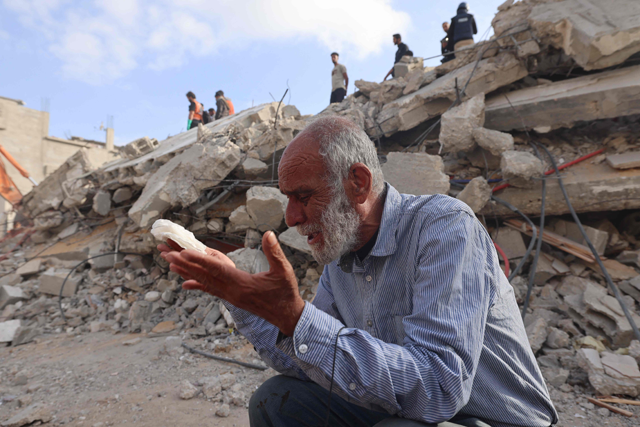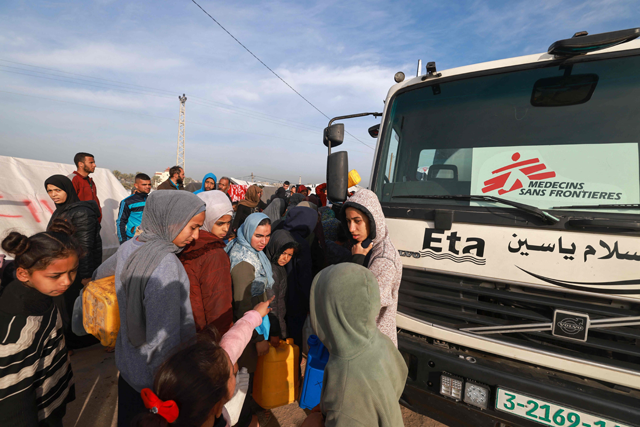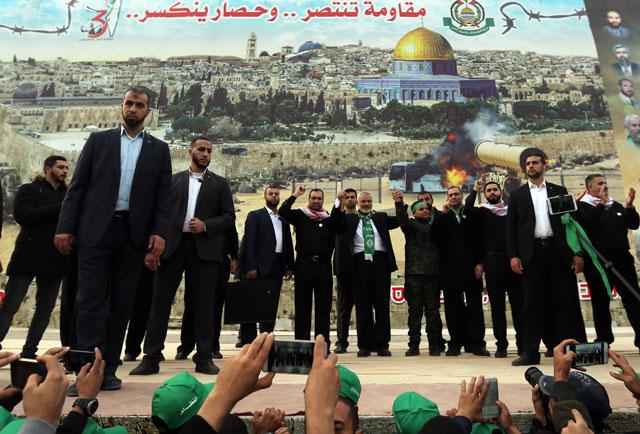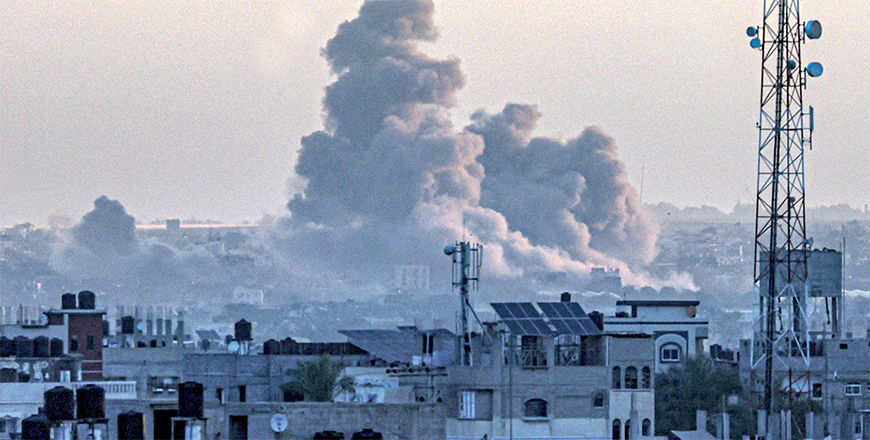You are here
Israel pounds Gaza as West Bank violence surges
By AFP - Apr 22,2024 - Last updated at Apr 22,2024

A Palestinian man wait for news of his daughter as rescue workers search for survivors under the rubble of a building hit in an overnight Israeli bombing in Rafah, in the southern Gaza Strip, on Sunday (AFP photo)
GAZA STRIP, Palestinian Territories — Israel carried out deadly strikes in Gaza, first responders in the war-battered Palestinian territory said on Sunday, as violence flared in the occupied West Bank.
The latest bombardments came as lawmakers in Israel's top ally, the United States, approved $13 billion in new Israeli military aid even as global criticism mounts over the death toll and dire humanitarian crisis in Gaza.
However, fears of wider war breaking out in the Middle East have eased somewhat after Iran downplayed Israel's reported retaliation over its unprecedented missile and drone attack on the country a week ago.
Attention has turned back towards the war in Gaza, which Israel hit with several strikes overnight, according to the Palestinian territory’s Civil Defence agency.
The bodies of 13 people, mostly children, were recovered after an Israeli strike hit the home of a family near the southernmost Gaza city of Rafah, the agency said. Other people were believed to be under rubble.
A separate Israeli strike on a home in the Rafah area killed at least three people and wounded others, Civil Defence said.
Resident Umm Hassan Kloub, 35, said her children screamed when they “woke up to a nightmare of an explosion”.
“Every second we live in terror, even the sound of Israeli aircraft doesn’t stop,” she said.
“We don’t know whether we will live or die. This is not life.”
‘Second Gaza’
Soon after the war began, when Hamas fighters from Gaza attacked southern Israel on October 7, Israel told Palestinians in northern Gaza to move to “safe zones” further south such as Rafah.
Around 1.5 million of Gaza’s 2.4 million people are now estimated to be sheltering in the city.
However, Israel has for two months threatened to invade the city in its mission to destroy Hamas.
The G7 group of developed economies said on Friday that it opposed a “full-scale military operation” there, fearing “catastrophic consequences” for Rafah’s civilians.
Violence has also flared in the Israeli-occupied West Bank, where a two-year surge in clashes has further escalated since the war broke out.
The Palestinian Red Crescent said on Saturday that at least 14 people were killed during an Israeli raid on a refugee camp in the northern West Bank.
The Israeli army said it killed 10 militants during the operation at Nur Shams camp, which started on Thursday.
A camp resident who declined to give his name said the West Bank had become a “second Gaza”.
“This is the first time in our history that we have seen such destruction, such devastation,” the grey-bearded man told AFP.
Separately, Israeli forces shot dead two Palestinian teenagers near the West Bank city of Hebron, the Palestinian health ministry said on Sunday, bringing to at least 483 the number of Palestinians killed by Israeli troops and settlers in the West Bank since October 7, according to ministry data.
The Israeli army said the two assailants had attempted to stab and shoot troops near the village of Beit Einun.
According to the Shin Bet internal security agency, at least 19 Israelis have been killed in Palestinian attacks in the West Bank since the Gaza war started.
US boosts Israeli defences
Much of the new military assistance approved by the US House of Representatives on Saturday was expected to be used to reinforce Israel’s air defences.
Israel welcomed the aid, while Hamas condemned it as a “green light” for continued Israeli “aggression”.
The US bill said that more than $9 billion will also be earmarked to address “the dire need for humanitarian assistance for Gaza as well as other vulnerable populations around the world”.
The boost for Israel’s defences comes after almost all of the more than 300 missiles and drones that Iran launched towards the country a week ago were intercepted, according to the Israeli military.
Israel had vowed to respond to Iran’s first-ever attack on its territory, which was itself retaliation for a deadly April 1 strike on Iran’s embassy consular annex in Damascus.
Iran blamed Israel for that attack.
Israel’s response appeared to come on Friday when explosions were reported in the central Iranian province of Isfahan.
Israeli officials have made no public comment, and Iranian Foreign Minister Hossein Amir-Abdollahian downplayed the incident.
He told NBC News that Tehran would not respond “as long as there is no new adventure on behalf of the Israeli regime against Iran’s interests”.
On Sunday, Israel said it will hold a “protest talk” with ambassadors from several United Nations Security Council members which voted for the “State of Palestine” to become a full UN member.
France, Japan and others backed the bid which the United States vetoed.
Israeli anger over hostages
Israel has faced growing global opposition to the war, which has turned vast areas of Gaza into rubble while a siege has left residents without enough water, food, medicines and other vital supplies.
The population “faces famine, malnutrition, and infectious disease outbreaks”, the International Rescue Committee charity warned this week.
Hamas’s attack that triggered the war resulted in the deaths of 1,170 people, according to an AFP tally based on Israeli official figures.
Israel’s retaliatory offensive has killed at least 34,097 people in Gaza, mostly women and children, according to the Hamas-run territory’s health ministry.
Prime minister Benjamin Netanyahu has also come under pressure within Israel, including to reach a deal for the release of hostages still held by Hamas. Israel estimates 129 captives remain in Gaza, including 34 who the military says are dead.
Families of the hostages were among thousands attending an anti-government protest in Tel Aviv on Saturday night.
Ofir Angrest, whose brother Matan was kidnapped on October 7, called for Jewish Israelis to leave an empty chair at their traditional Seder meals marking the beginning of the holiday Passover on Monday.
“Enough! After more than six months, you’re simply disrespecting me and the families of the hostages,” Angrest said, adding that he was addressing the Israeli Cabinet.
Related Articles
GAZA STRIP, Palestinian Territories — Fighting raged across Gaza and Israeli units raided the West Bank on Sunday after embat
GAZA CITY, Palestinian Territories — Hamas leader Ismail Haniya praised “resistance” in the occupied West Bank in a speech to tens of thousa
GAZA STRIP, Palestinian Territories — The war between Israel and Hamas entered its 100th day on Sunday after Israeli prime minister Ben














